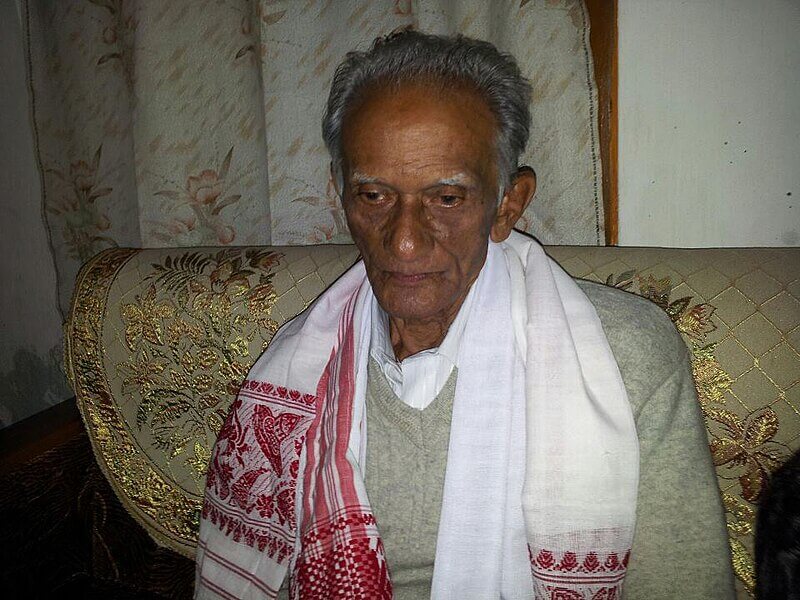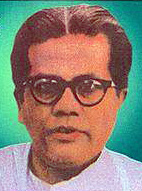Popularly recognized as Nawab Imran Shah, this eminent litterateur of Assam was born on 23rd November 1933 in Sivasagar. His father, Muhammad Shah, and mother, Mariam Nessa, nurtured a family where he was the 11th child. His literary brilliance earned him the title Kothahilpi, reflecting his deep passion for storytelling and poetry.
Early Life and Education
He began his schooling at No. 2 Dhai Ali Primary School in Sivasagar and later moved to Sivasagar Government School in 1943. After completing his schooling in 1952, he pursued the ISC course at Cotton College, Guwahati. He earned a B.A. degree from Sibsagar College in 1958 and later completed an M.A. in the Assamese language from Gauhati University.
Professional Journey
His professional life began as a temporary teacher at Kunwarpur High School, Sivasagar. After completing ISC, he joined Sivasagar High Madrassa School. Following his B.A., he worked as a temporary lecturer at Gargaon College, Sivasagar. However, he left this job to pursue his M.A. degree.
In 1962, after completing his M.A., he rejoined Gargaon College as a lecturer. In 1993, he became a lecturer in Assamese at Sibsagar College, where he eventually retired as the Head of the Department of Assamese in the same year.
Even after retirement, his passion for education remained unwavering. He established Arunudoi College, a junior college near his home in Dhai Ali, and served as its principal.
Family Life
His wife passed away on 12th February 1981, leaving behind their two daughters, Ema and Dima.
Literary Contributions
His literary journey began during his school days, with his first poetry book, Banvashi, being published while he was still a student. At the age of 15, while studying in Class X, his first novel, Sangeetor Hkhipare, was released.
Over time, he contributed to Assamese literature under pen names like Ishan Dutta, Anamika Baruah, Kumbhakarna, and Animesh Baruah. His first short story, Aparicheeta, was published in 1958 in Natun Asomiya magazine.
One of his notable novels, Rajanigandha, inspired the Assamese film Rasmirekha (1973), produced by Prafulla Baruah. His works span poetry, novels, short stories, translations, and essays.
Selected Works of Imran Shah
- Banvashi (Poetry)
- Sangeetor Hkhipare (Novel)
- Kranti Rekha (Novel)
- Jabanbandi (Novel)
- Dhou Bhagi Dhou (Poetry)
- Kavi Pulish (Novel)
- Mur Phulanir Phool (Prose)
- Bandi Bihonggome Kande (Novel)
- Piyamukh Chanda (Poetry)
- Asomiya Sangskritiloi Musalmanor Avadaan (Lecture)
Imran Shah also edited anthologies like Bosoror Galpa and worked on translations, including Kreetodasor Hahi and Inkilaab. His novels like Sagarikaa, Tansen, and Tathapi Sagar have enriched Assamese literature.
Awards and Recognitions
- He received the Assam Valley Literary Award (2009) for his immense contribution to Assamese literature. The award was formally presented on 27th March 2010 in Guwahati.
- He was also honored with the Ajan Peer Award (2008) by the Assam Government.
Leadership Roles
In 2013, he was elected as the President of the Asom Sahitya Sabha for the 2013–2015 session. Under his leadership, the organization strengthened its focus on literature and culture.
Unique Contributions
Imran Shah’s literary excellence is not just about the volume of his works but the depth and range of topics he explored. From poetry to translations, his creations have bridged gaps between cultures and enriched Assamese literature in a remarkable way. Additionally, his novel Jabanbandi was adapted for a radio broadcast by All India Radio, Dibrugarh, further cementing his influence.
Imran Shah remains an inspiration for aspiring writers, a beacon for Assamese culture, and a literary figure whose works continue to touch hearts across generations.
FAQ’s:
Q 1. Who is Imran Shah, and why is he famous?
Imran Shah, also known as Nawab Imran Shah, was an eminent litterateur from Assam. He is known for his extensive contributions to Assamese literature, including novels, poetry, and short stories.
Q 2. What are some of the notable works of Imran Shah?
Some of his notable works include Jabanbandi, Rajanigandha, Banvashi, Kranti Rekha, Dhou Bhagi Dhou, Bandi Bihonggome Kande, and Mur Phulanir Phool.
Q 3. What pen names did Imran Shah use for his writings?
Imran Shah wrote under several pen names, including Ishan Dutta, Anamika Baruah, Kumbhakarna, and Animesh Baruah.
Q 4. What awards did Imran Shah receive for his literary contributions?
He received prestigious awards such as the Assam Valley Literary Award (2009) and the Ajan Peer Award (2008) for his excellence in literature.
Q 5. Which educational institutions did Imran Shah attend?
Imran Shah studied at Sivasagar Government School, Cotton College (for ISC), Sibsagar College (for B.A.), and Gauhati University (for M.A. in Assamese).
Q 6. What was Imran Shah’s role in Asom Sahitya Sabha?
Imran Shah served as the President of Asom Sahitya Sabha, the apex literary body of Assam, for the session 2013–2015.
Q 7. What is the significance of the novel Rajanigandha?
Rajanigandha is one of Imran Shah’s famous novels, which inspired the Assamese film Rasmirekha in 1973.
Q 8. When did Imran Shah begin his literary career?
Imran Shah began his literary journey during his school days, publishing his first poetry book, Banvashi, and his first novel, Sangeetor Hkhipare, while he was still a student.
Q 9. What was Imran Shah’s professional career apart from writing?
Imran Shah worked as a teacher and lecturer in several institutions, including Gargaon College and Sibsagar College, where he retired as the Head of the Assamese Department in 1993.
Q 10. What makes Imran Shah unique among Assamese writers?
Imran Shah’s versatility, use of multiple pen names, and ability to write across genres like poetry, novels, short stories, and translations set him apart. His works reflect Assamese culture, history, and the rich heritage of the region.












